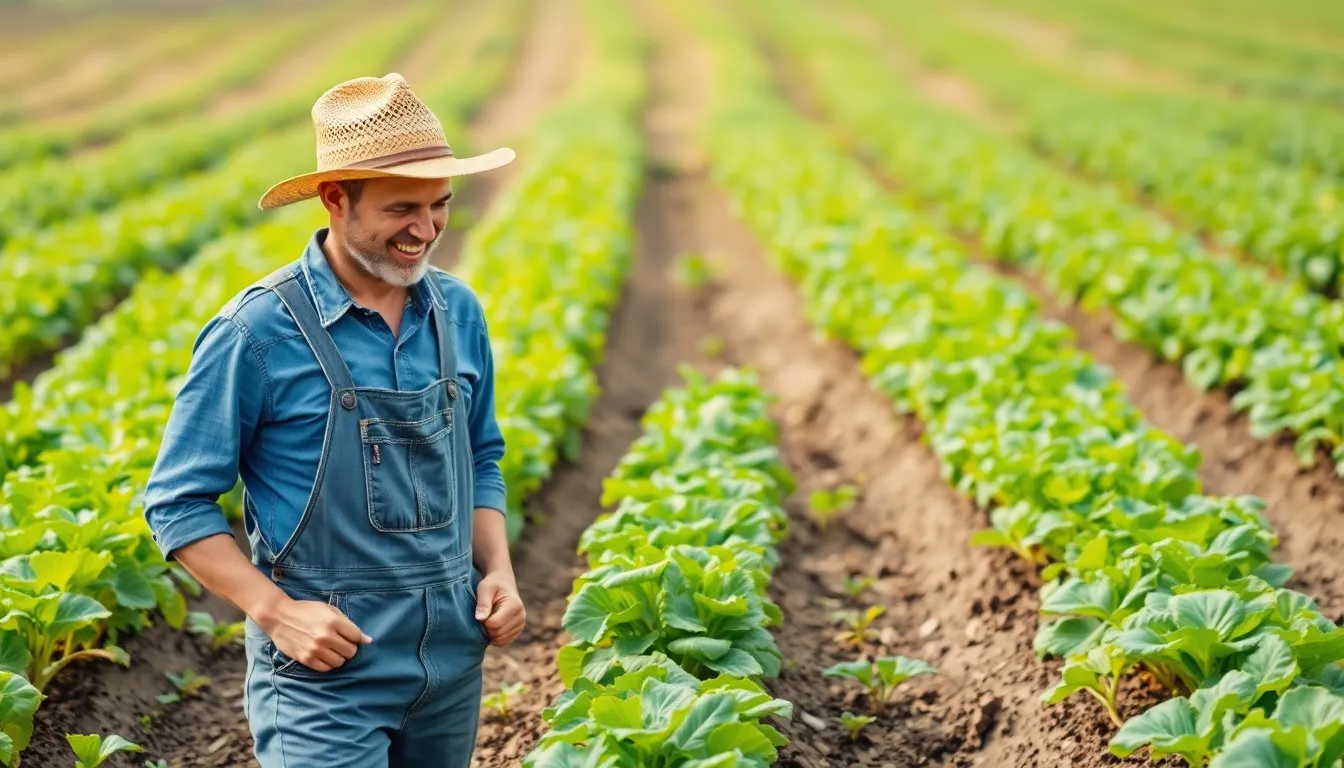The Best Fluffy Pancakes recipe you will fall in love with. Full of tips and tricks to help you make the best pancakes.

Organic farming isn’t just a trend; it’s a revolution in how we grow our food. In the world of AP Human Geography, understanding organic farming is like discovering the secret sauce of sustainable agriculture. It’s not just about avoiding pesticides and chemicals; it’s about nurturing the soil, promoting biodiversity, and, yes, saving the planet one carrot at a time.
Organic Farming Definition in AP Human Geography
Organic farming represents a method of agriculture that emphasizes ecological balance and sustainability. This approach involves avoiding synthetic fertilizers and pesticides, thereby fostering a healthier environment.
Key Principles of Organic Farming
Organic farming operates on several foundational principles. Soil health receives primary consideration, focusing on enriching it through natural means. Biodiversity is another essential aspect, as diverse ecosystems enhance resilience against pests and diseases. Crop rotation and cover cropping serve as techniques to maintain soil fertility, preventing nutrient depletion. Compliance with organic standards ensures that farmers adhere to rigorous guidelines that promote ethical practices.
Importance of Organic Farming
Organic farming plays a crucial role in food production and environmental conservation. This method reduces pollution through the avoidance of harmful chemicals, improving air and water quality. Supporting local economies emerges from organic farms’ emphasis on community-based production and distribution. Additionally, organic practices help mitigate climate change by promoting carbon sequestration in healthier soils. Health benefits for consumers also arise from organic produce, which often contains fewer pesticide residues.
Sustainable Practices in Organic Farming

Sustainable practices are essential elements of organic farming. These methods enhance environmental health while promoting long-term agricultural productivity.
Crop Rotation and Biodiversity
Crop rotation fosters biodiversity and enhances the resilience of agricultural systems. This method involves alternating different crops in the same area across seasons. It prevents soil depletion by breaking pest and disease cycles. Farmers report increased yields and healthier ecosystems with this practice. Higher biodiversity also attracts beneficial insects and wildlife, contributing to natural pest control.
Soil Health and Fertility
Soil health directly influences crop productivity and sustainability. Organic farmers prioritize practices that improve soil fertility, such as compost application and cover cropping. Organic matter enriches the soil, leading to better water retention and nutrient availability. Regular soil testing helps farmers monitor and maintain optimal conditions for plant growth. Enhanced soil health results in robust plants and increased resistance to pests and diseases.
Economic and Social Impacts of Organic Farming
Organic farming significantly influences economies and societies. The unique practices tied to organic methods resonate with growing consumer awareness and preference for healthier food options.
Market Trends and Consumer Demand
Market trends indicate a strong consumer shift towards organic products. Reports from the Organic Trade Association show that sales of organic food in the U.S. exceeded $62 billion in 2021. This shift correlates with increased health consciousness among consumers, who prioritize food quality and nutrition. Higher demand drives farmers to adopt organic practices, enhancing their market position. Retailers also respond by expanding organic product lines, making organic options more accessible. Furthermore, younger generations are leading this trend, with millennials and Gen Z showing a keen interest in sustainable eating. They often prefer purchasing from brands that emphasize transparency and environmental responsibility.
Community and Local Benefits
Communities benefit substantially from organic farming initiatives. Local economies thrive as organic farms often source materials and labor from nearby areas. This approach fosters job creation and supports rural development. Organic farms also encourage community engagement through farmers’ markets, workshops, and educational programs. These events enhance awareness about sustainable practices and promote healthier eating. Additionally, organic farms contribute to local food security by providing fresh produce, which can reduce reliance on imported goods. Environmental advantages further support community well-being, as organic practices enhance soil health and reduce pollution.
Challenges Facing Organic Farming
Organic farming encounters numerous challenges that influence its growth and sustainability. Farmers often face higher production costs due to the labor-intensive practices associated with organic methods. Obtaining organic certification requires compliance with strict regulations, which can be time-consuming and expensive.
Market competition poses another significant challenge. Conventional farming practices dominate the market, making it difficult for organic farmers to compete on price. Additionally, consumer awareness and demand for organic products can fluctuate, affecting farmers’ profits and sustainability.
Pest management in organic farming can be complex. Farmers cannot resort to synthetic pesticides, leading to reliance on natural methods that may not be as effective or readily available. Crop diversification and natural predation must be strategically implemented to manage pest populations effectively.
Soil health also presents ongoing challenges. Organic farming prioritizes soil enrichment, yet practices such as crop rotation can take years to yield visible improvements. Farmers must invest time and resources to enhance soil fertility while maintaining productivity during the transition phase.
Weather variability directly impacts organic farming. Organic farmers often depend on specific climatic conditions favorable for the growth of certain crops. Unpredictable weather patterns can lead to crop losses, affecting overall yields and economic viability.
Access to reliable resources remains crucial. Many organic farmers lack access to quality organic seeds, fertilizers, and information on sustainable practices. Strengthening supply chains and providing educational resources can significantly help address these gaps.
Addressing these challenges involves collaboration among stakeholders. Farmers, government agencies, and organizations must work together to create supportive policies and resources. Enhancing public awareness of organic farming can help secure a more stable market and ensure long-term success for organic farmers.
Conclusion
Organic farming represents a vital shift in agricultural practices that prioritizes sustainability and environmental health. By focusing on soil health and biodiversity, it not only enhances food quality but also fosters community engagement and local economies. The increasing consumer demand for organic products illustrates a growing awareness of health and ecological impacts. Despite the challenges organic farmers face, such as production costs and pest management, the commitment to sustainable practices offers a promising path forward. Collaboration among stakeholders is essential to overcoming these hurdles and ensuring the long-term viability of organic farming. As society continues to embrace these principles, organic farming will play a crucial role in shaping a healthier future for both people and the planet.
